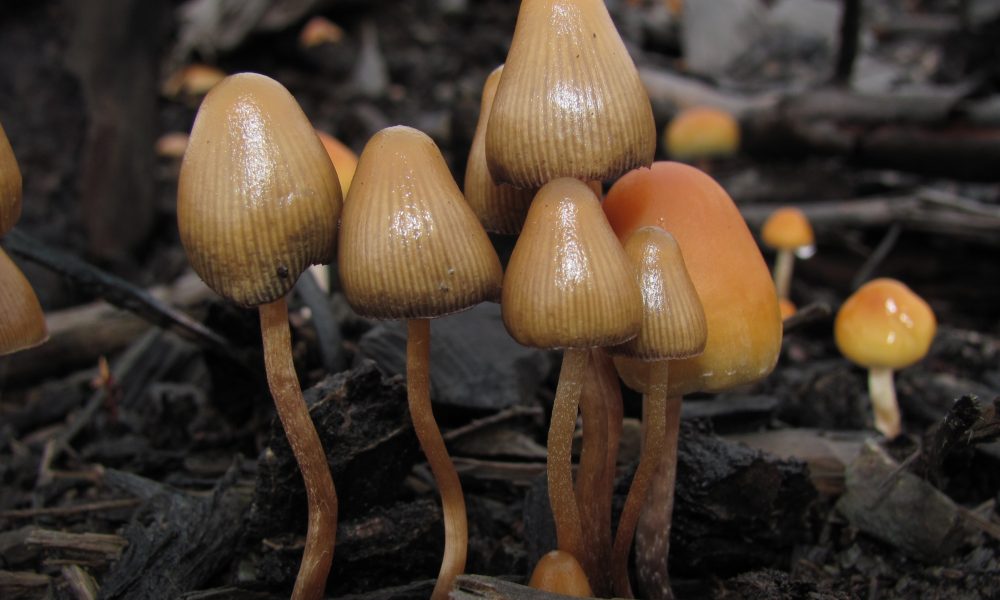The Drug Enforcement Administration (DEA) has released its final 2023 production quotas for drugs to be used in research—and the agency is now calling for even more manufacturing of psychedelic compounds like MDMA, psilocyn and 5-MeO-DMT than the existing significant increases it had initially proposed for next year.
DEA first listed the target 2023 production goals for controlled substances last month, with significant increases in the proposed quota for drugs like marijuana, psilocyn, LSD and mescaline compared to 2022. Now, following a public comment period, it’s expanding certain quotas even further.
For psilocyn, for example, the agency originally set its 2023 goal at 8,000 grams, which already represented a doubling of the 2022 amount. DEA now says it’s aiming for 12,000 grams of the psychedelic compound, which is found in so-called magic mushrooms.
It further wants to increase the quotas for 5-MeO-DMT from an initial 6,000 to 11,000 and MDMA from 8,200 to 12,000 grams. The most significant changes in the final 2023 production numbers were for MDA, which jumped from 200 to 12,000 grams and 2-CB, which went from 25 to 5,100 grams.
“DEA is committed to ensuring an adequate and uninterrupted supply of controlled substances in order to meet the estimated legitimate medical, scientific, research, and industrial needs of the U.S., for lawful export requirements, and for the establishment and maintenance of reserve stocks,” the agency said several times in a notice set to be published in the Federal Register on Friday.
For marijuana, DEA also boosted the production quota in the initial 2023 proposal, saying it wants to see 6.7 million grams (or 14,770 pounds) of cannabis grown next year to meet those medical and scientific demands. That numbers is staying the same in the new final filing.
The agency’s final marijuana quota for 2022 was 3.2 million grams, and it was 2 million grams for 2021.
Growing millions of grams of cannabis may be easier since DEA finally authorized additional manufacturers at the beginning of the year. Those approved cultivators are now able to apply for a contract to be federal marijuana suppliers for study purposes under the National Institute on Drug Abuse (NIDA).
Other drug quota levels that didn’t change since the initial 2023 proposal from last month include psilocybin (8,000 grams), DMT (3,000 grams), LSD (1,200 grams) and mescaline (1,200 grams).
DEA said that it received one comment on the 2023 proposed quota that called on the agency to create “diversified categories for production and research on psilocybin-containing fungi fruiting bodies/sclerotia/liquid culture similar to cannabis (flower), fruiting body extract (akin to cannabis extract), and psilocybin and psilocyn separately as purified compounds (akin to delta-9-thc).”
The commenter also advocated that the “same system should then be replicated in regards to lophophora/mescaline, as well as other plants, fungi and lifeforms, which produce these compounds being used in whole or closer to whole ways.”
But DEA responded that the suggestions “do not impact the analysis involved in establishing” the production goals.
Additionally, the agency said that biotech companies had reached out with recommendations that DEA “consider adjusting the relevant schedule I controlled substance APQ to allow for future pre-clinical and clinical trial research for post-traumatic stress disorder (PTSD), treatment-resistant depression, schizophrenia, and anxiety.”
One of those biotech companies had told DEA that it felt the quantity of MDMA should be increased for 2023, explaining its intent to research the drug for the treatment of PTSD.
The agency has touted its Schedule I drug production quotas as evidence that is supports rigorous research into the substances, but it’s faced criticism from advocates and scientists over actions that are viewed as antithetical to promoting studies.
Following pushback, DEA recently retreated on a proposed ban on psychedelic compounds that scientists say have research value.
That marked another win for scientific community, coming just one month after DEA abandoned separate plans to place five tryptamine psychedelics in Schedule I.
At the same time, advocates have raised questions about why DEA recently descheduled a cocaine derivative while dismissing public comments arguing that cannabis should be removed from federal control, too.
Meanwhile, the Justice Department is now carrying out a scientific review of marijuana after President Joe Biden issued a scheduling directive last month that accompanied a pardon proclamation for people who’ve committed federal cannabis possession offenses.
DOJ and the U.S. Department of Health and Human Services (HHS) have committed to carrying out the review expeditiously.
Nevada Regulators Award State’s First Marijuana Consumption Lounge Licenses In Lottery Drawings
Photo courtesy of Wikimedia/Mushroom Observer.
Read the full article here









